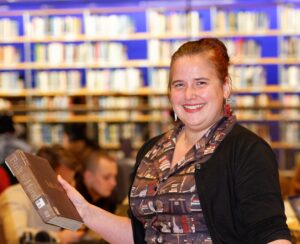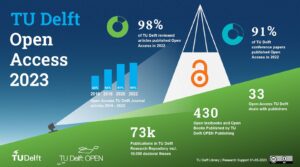
Walk into the TU Delft Library and it’s hard to miss the vast wall of books that stretches from the ground level up to the fourth floor. But there is so much more than meets the eye. From a research and educational repository, to historical treasures, databases, journals, multimedia resources, and more the Library’s collection serves as a vital resource to the students, faculty, and staff of TU Delft.
As Collection Manager for the TU Delft Library, Louise Otting plays a pivotal role in curating, managing, and enhancing the Library’s now mostly digital resources, making sure they align with user’s needs and the mission of the university. So, how does she do that?
Knowledge is for sharing
Though the TU Delft Library’s collection is immense, Otting’s current focus is mainly on managing the sources needed for research and education, which includes journals, e-books, and databases. “A lot of things changed within these types of collections when we shifted to digital and open science,” she said. “We find this very important because we want to make sure that knowledge is as freely available as possible and that as many people as possible can get access to learn and to build on that knowledge.”
With open science being one of the core values of the Library, the shift was a significant step and the Library’s role continues to evolve as part of the process. That need to evolve is certainly true when it comes to the domain of journals and publishing.
The changing landscape of publishing
Most publishers are commercial entities aiming to make a profit, which has generally come from subscription fees in the past. But with the shift to digital journals, even though there is no longer a physical output, Otting said publishers still make money from subscriptions by putting content behind a paywall. “So we tried to sort of flip the system and say, what if we pay you for the publications and then you’ll make them freely available to everyone,” said Otting. “That’s the ideal.” There was a hope that this would be a sustainable model, but that has not been the case.
While the publishers aim for both growth in content and profit, TU Delft’s aim is to make knowledge available and reusable, which is a sort of disconnect. Otting noted that most publishers now have hybrid journals that are still behind the paywall, but that TU Delft also pays for certain articles to be open. “It’s better than it was,” she said, “but it hasn’t been the change that we hoped for yet.”
Access for all
The balancing act between the commercial publishers who want notable articles and more sales, the libraries that want to push for the openness of reliable knowledge and transparency, and researchers that operate in a ‘publish or perish’ environment is complicated. “With the big challenges the world is facing, we need to work together and build on each other’s work as much as possible,” said Otting.
But the rising costs of publishing are in conflict with the idea of openness and adversely impact those who don’t have access to funding. “In my ideal future, I hope that researchers get a chance to breathe and really think about what, where and how to share with the world,” she said. “I would very much hope that prestigious names of certain journals become less important than who the readers are and also how they help with the challenges the world faces.”
Knowing the options

For new researchers who are building their careers, big names in publishing will remain important for a long time. “So give them the chance, let’s use the funds for them, make sure that they can establish their name and if necessary, publish in these very expensive journals.” But maybe, Otting said, the researchers that are already established can start looking into better, more open alternatives. And there are a growing number of options when it comes to open publishing. For example, Otting is instrumental in negotiating agreements with publishers and there is also the Open Access Fund at TU Delft to help researchers finance publishing costs. But another great option, said Otting, is TU Delft OPEN Publishing. “They have an amazing team with a lot of expertise and connections that are already in place.”
And knowing the numbers when it comes to publishing is important Otting said, because the established journals are not necessarily the most read or most cited. “We want the numbers to be as transparent as possible, so we built a dashboard that you can filter on your faculty or the whole of the TU Delft. It shows where other peers are publishing, as well as how many times they have been cited and viewed,” she said. Having data that you can trust helps researchers make the best decisions.
The big picture
Otting said that the Library offers many different solutions, trying to make sure that people get what they need while aligning with the mission of TU Delft. Users can access or request books, journals, publications, databases and more. They can get help with creating open educational resources, with openly publishing articles or figuring out where best to publish.
“We have so many options and services here at the Library. It’s much more than a collection of books, so please make use of our knowledge. And look at the big picture because we have to make sure that as a university, we protect the way we share knowledge in both research and education, and that we make sure that it is widely available for those that are looking for it.”
